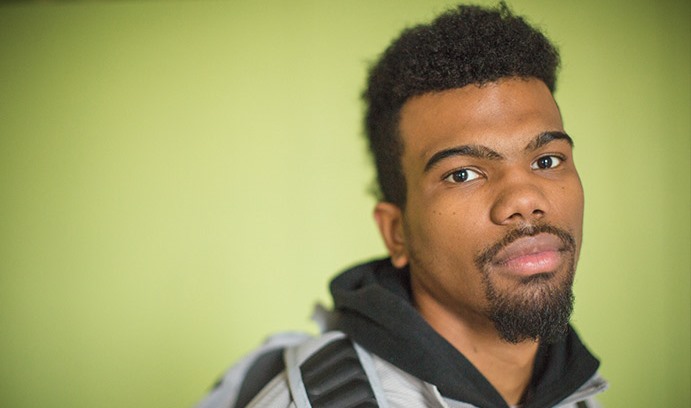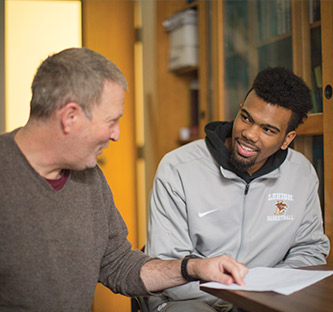Stereotypes and Sports

Carter hopes to publish his research findings in an academic journal. (Photo by Douglas Benedict)
As a tall African-American man, Devon Carter fits the profile of someone who everyone thinks must be good at basketball.
As a senior point guard on Lehigh's men's basketball team, he is, like many black athletes, very concerned about racial stereotypes and sports.
These days, however, Carter is doing much more than simply thinking about the topic. The psychology major is in the midst of a senior thesis that examines how race affects the way athletes' behavior is interpreted and the manner in which people react to it.
Carter is looking at a variety of sports, ethnicities and behavior, both on and off the playing field, for his research. He offers a simple example from his own sport to illustrate his point.
"Take the situation where a Caucasian player is being guarded by an African-American," he says. "The stereotype is that a white basketball player doesn't have natural ability. So maybe the African-American player doesn't guard a white player as hard.
"But what happens if he makes the shot? If a white player is good, he must be hard-working. Is the African-American player more prepared to block the next time the Caucasian player comes down the court?
"On the other hand, to make a jump shot requires a lot of practice and hard work. If shooting requires hard work, is the African-American player's shot just luck," he asks?
Off the court, the question becomes, "Is LeBron arrogant or confident?"
Or you have incidents like the Los Angeles Lakers' Kobe Bryant, a well-known African-American sports star, being accused of sexual assault in 2004 and making headlines around the world. Meanwhile, Pittsburgh Steelers quarterback Ben Roethlisberger, a white athlete, faced similar accusations a few years later and the episode was seemingly swept under the rug, Carter says.
An interesting off-shoot that has already emerged in his research relates to the idea of how competition could be influenced by ethnic culture, Carter says.
African-Americans and Hispanics tend to be more family-focused, he says, which leads to the question of whether these groups might be more naturally predisposed to teamwork. Caucasians are thought to have a more "what can I get out of it attitude," by contrast, which could mean they are more likely to try to make a challenging shot themselves and less likely to pass the ball to another player, he says.
There are many interesting facets to this project, Carter says, and he and his senior advisor, Gordon B. Moskowitz, professor and department chair of psychology, honed in on some specific threads during the spring semester.
There could even be a component of his research that connects racial stereotypes and the decisions a referee makes, which can have a huge impact on athletes, especially at the professional level.
"Technical fouls equal fines," says Carter. "We'll see how that will develop later on."
Ultimately, Carter's goal is to develop a research paper that can be published in an academic journal.
Carter knew nothing about Lehigh until his freshman year of high school, when he and his father were watching an NCAA game on TV. Lehigh lost to the University of Kansas in that 2010 matchup but the Mountain Hawks impressed Carter's dad.
"Originally Kansas was my dream school," Carter recalls. "But my dad said, ‘Lehigh looks really cool. You should look into it.'" Fast forward a few years and C.J. McCollum, who as a player had been on the court during the Lehigh-Kansas game, came to Carter's high school in Cleveland recruiting for Lehigh. "He told me that academically Lehigh will set you up for life," Carter says.
Carter finished his undergraduate degree in May 2016 and hopes to stay on at Lehigh for graduate school, ultimately earning a Ph.D. in social psychology and someday becoming a professor. A goal, he says, that was inspired by Moskowitz.
"His mentoring led me to want to do what he does," Carter says. "I want to teach and to give back.
"I want to stay here as long as possible. This is my dream school. Coming here was the best decision of my life."
Story by Jennifer Marangos '93, '95 M.A.
Posted on:


